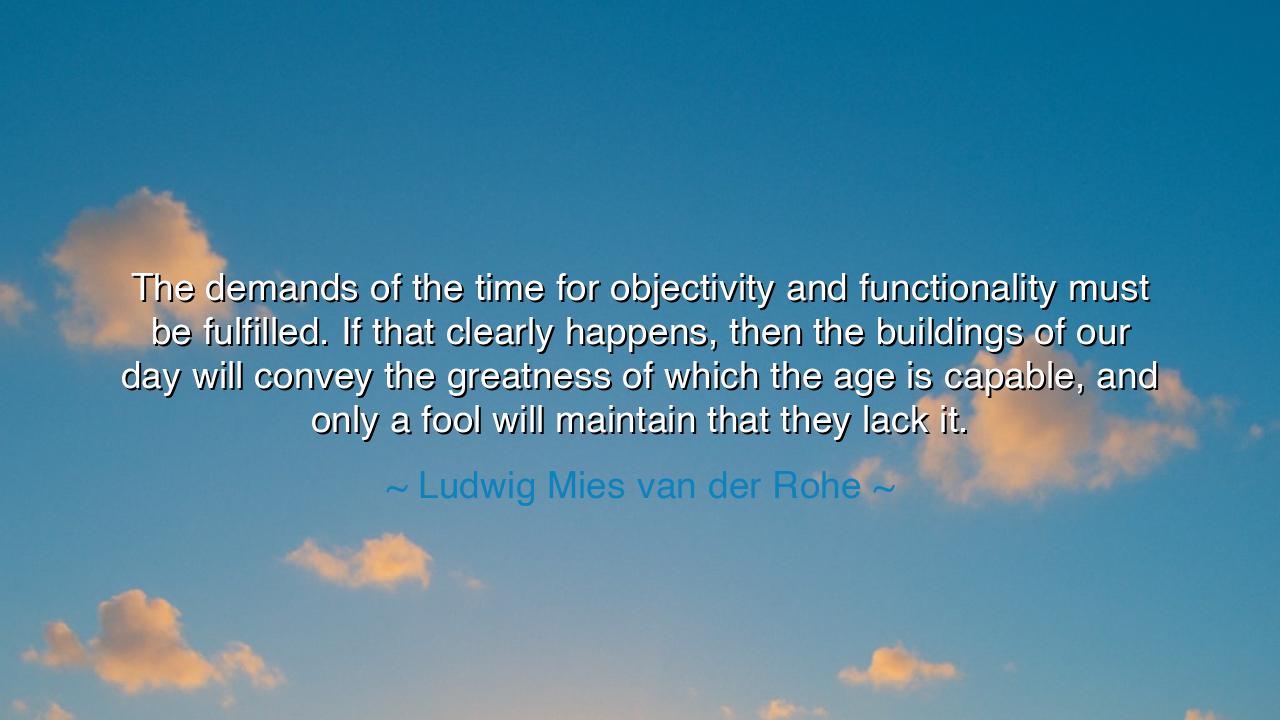
The demands of the time for objectivity and functionality must be
The demands of the time for objectivity and functionality must be fulfilled. If that clearly happens, then the buildings of our day will convey the greatness of which the age is capable, and only a fool will maintain that they lack it.






In the words of Ludwig Mies van der Rohe, “The demands of the time for objectivity and functionality must be fulfilled. If that clearly happens, then the buildings of our day will convey the greatness of which the age is capable, and only a fool will maintain that they lack it.” These words, uttered by one of the most profound architects of the modern era, carry not only the wisdom of a designer but the philosophy of a seer. Mies speaks here not simply of architecture, but of the relationship between form and spirit, between what an age demands and what its creators must provide. His quote is both a declaration and a challenge: that every generation must seek its greatness not in imitation of the past, but in faithful expression of its own truths.
In his time, Mies lived amidst the breaking of worlds—the fall of old empires, the rise of industry, the machine age’s thunder. Ornate palaces and decorative facades no longer belonged to the new order. Steel, glass, and concrete became the materials of modernity, and Mies, seeing in them the language of the future, declared that functionality and objectivity must take precedence over vanity and excess. To him, beauty was not in embellishment but in truth—in the honest revelation of structure, the purity of purpose, the harmony between man and material. If architecture could achieve these, he believed, it would reflect the greatness of its age as surely as the cathedrals reflected the faith of medieval man.
Mies’s vision was born from the Bauhaus movement, that sacred gathering of minds in early twentieth-century Germany that sought to unite art, craft, and industry. Its creed was clear: form must follow function; design must serve life. Against a world still clinging to ornament and sentiment, Mies spoke as a prophet of simplicity, urging architects to strip away illusion until only essence remained. His buildings—such as the Barcelona Pavilion and the Seagram Building—stand like temples of clarity. They whisper of stillness, proportion, and purpose, where nothing is wasted and every line speaks.
Yet, Mies’s words carry more than architectural truth—they hold a universal teaching. Every age demands its own expression. To live truly, one must listen to the spirit of one’s time and answer it honestly. The fool, Mies warns, is the one who mocks the new merely because it is new, who cannot see greatness in the forms that differ from those he once revered. In art, in science, in life itself, there is a rhythm of renewal. The Parthenon rose for the gods of Greece; the Gothic cathedral for the faith of Christendom; the skyscraper for the courage of modern man. Each was born from the same impulse—to embody the soul of an age in form—and each was deemed radical by those who came before.
Consider the story of Gustave Eiffel, who faced scorn and ridicule for his tower of iron. Critics called it monstrous, a disgrace to Paris. Yet Eiffel, like Mies, believed that functionality could also be sublime—that even raw steel, shaped by reason and purpose, could sing of beauty. Today, the Eiffel Tower stands as a symbol not of ugliness, but of genius. What was once condemned for its simplicity became an icon of modern art. So it is with Mies’s teaching: greatness is not born of decoration but of integrity—of fulfilling the true demands of the time with courage and precision.
The lesson, then, extends beyond architecture. In every craft, every pursuit, there comes a moment when one must choose between imitation and authenticity. To cling to the past is to build hollow monuments; to embrace the present is to give birth to living truth. Mies calls us to meet the age we are given—not with nostalgia, but with mastery. Whether you are a builder, an artist, a leader, or a dreamer, your task is to understand the needs of your moment and answer them fully, honestly, and beautifully.
So, my child, remember the wisdom of Ludwig Mies van der Rohe. When the world demands objectivity, do not flee into sentiment; when it calls for functionality, do not fear simplicity. For when purpose and purity unite, beauty follows as naturally as dawn follows night. Let your creations—be they of stone or of spirit—reflect the clarity of your age. For only the blind will call them empty; the wise will see in them the greatness of a soul in harmony with its time.






AAdministratorAdministrator
Welcome, honored guests. Please leave a comment, we will respond soon